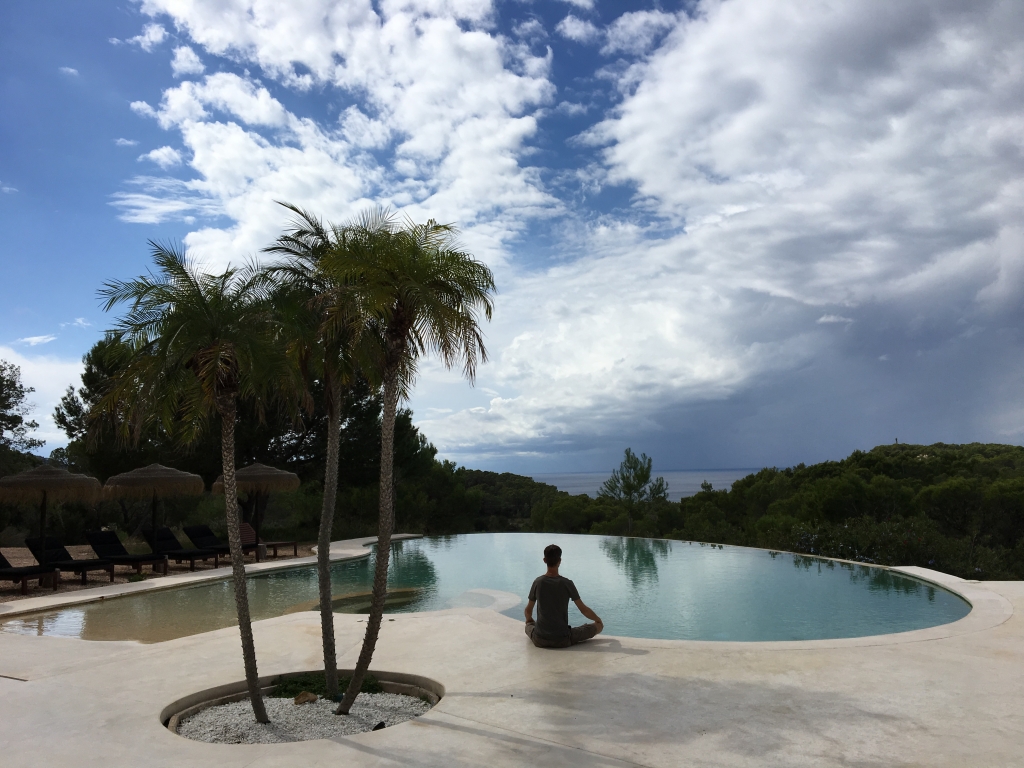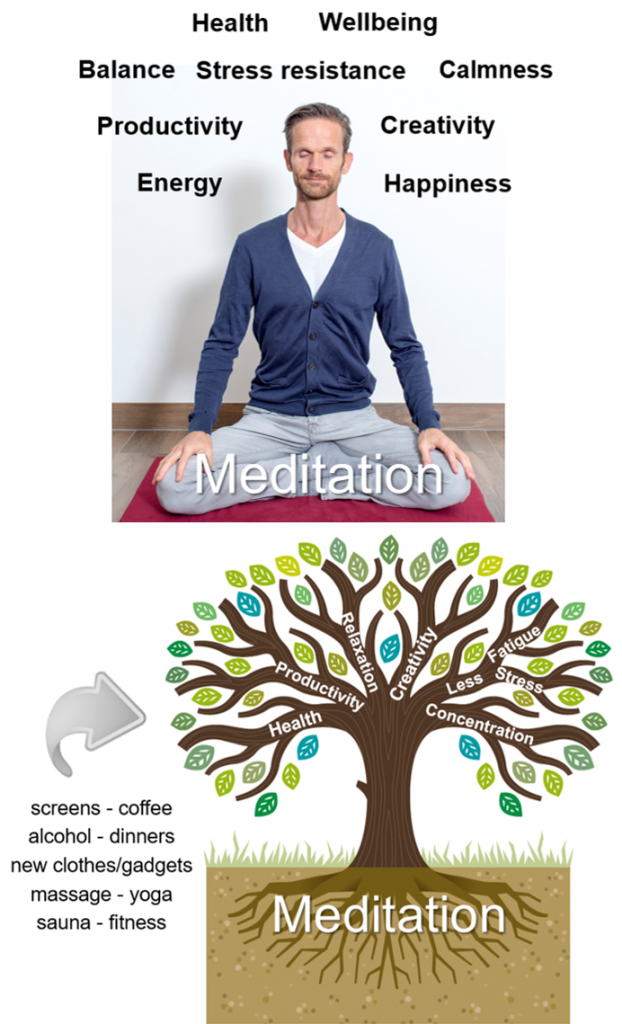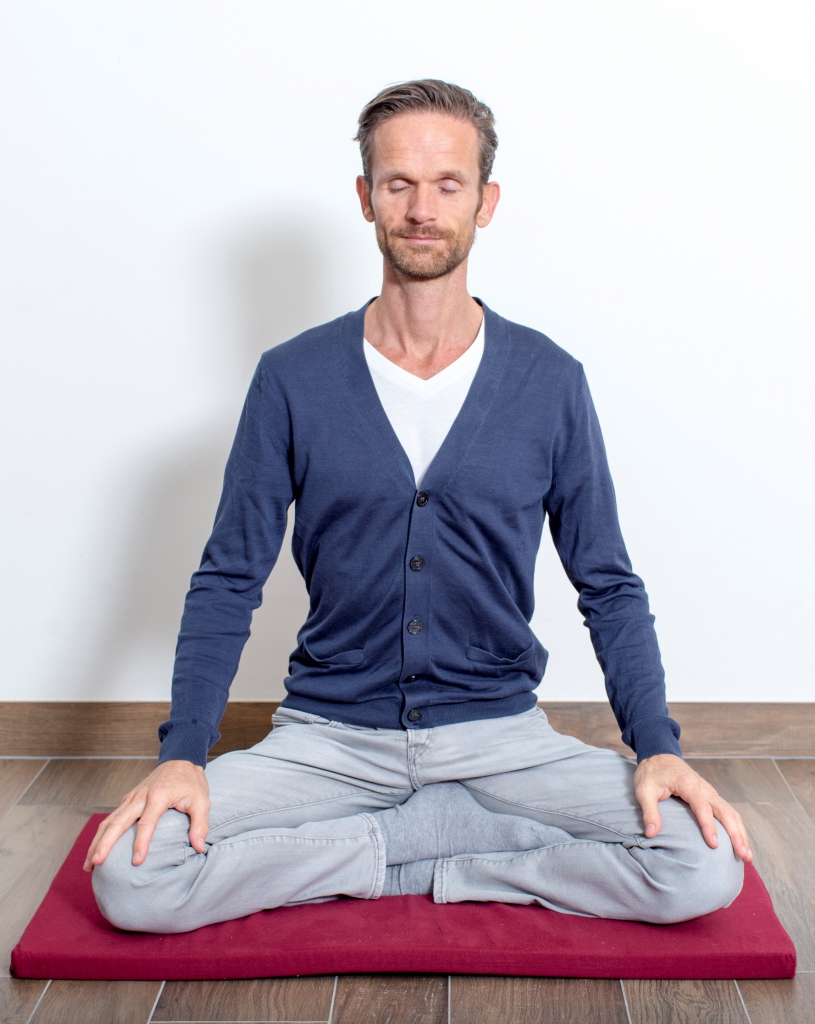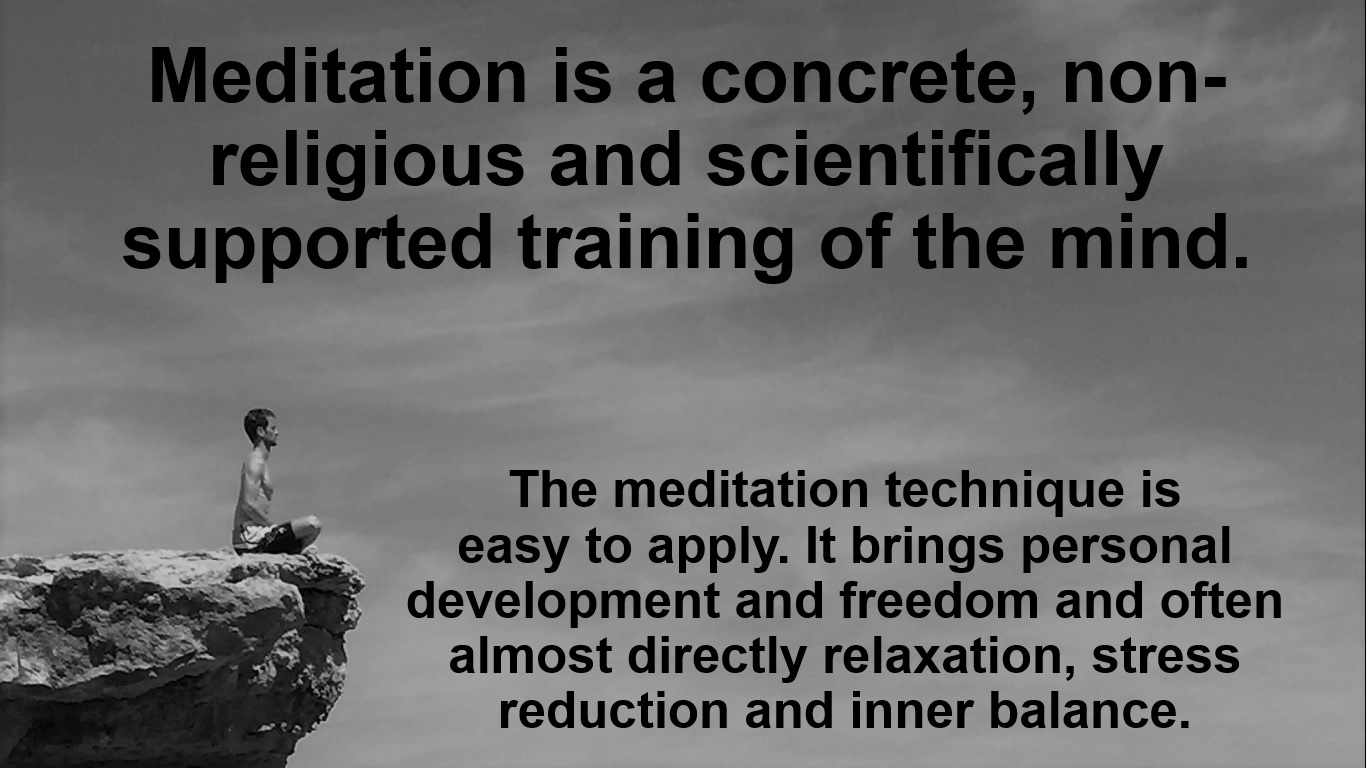
Nowadays almost everybody has an idea what meditation is. That leads to a lot of concepts about what should or has to happen during meditation. Often this is influenced by pictures of meditating people in magazines whereby they often look completely calm and happy, are dressed in white and are on a beach or at al lake in nature. Of course these are fine places to meditate (like me on this picture), the outer appereance doesn’t say anything about the inner experience. Meditation is training the mind and different from sitting still with your eyes closed or doing relaxation exercises. That is also leads to different results and different activation patterns in the brain, is confirmed by scientific research (Irrmischer 2018 – Zeidan 2015 – Hwang 2018 – Creswell 2016 – Levy 2012).
People often think that meditation should bring you directly to a ‘zen-state’, where all that isn’t pleasant disappears, your thoughts and problems are gone and all is peaceful and balanced. People that meditated before know that this isn’t the goal of meditation. Whatever you experience during meditation is never ‘wrong’. Also if you are completely restless and in a storm of thoughts and emotions.
In meditation it isn’t about what you observe, it is all about what you do with it. Because you learn to just observe what is and therefore change your relationship with it, meditation leads to relaxation, overview, balance and eventually mental freedom. This is the result of meditation, not the goal for during your meditation session.
That during a session doesn’t happen what you expect, is why a lot of people very quickly come to the conclusion that it doesn’t work (for them). It isn’t just a challenge for people that start with meditation. Also more experienced meditators often have an idea about if their session was ‘good’ or ‘not good’, where the only ‘bad’ meditation is the one that you didn’t do. Meditation brings the focus inwards. Not to escape from the external world and circumstances or to get rid of it though. It’s purpose is to get to know and experience your internal better and find your calm and balance there.
By meditating you learn how your mind actually works. Something your parents and teachers generally didn’t teach you. Also you learn how to work with it, so you gain control over how you position yourself in the world and are find yourself less time being kidnapped involuntarily by what happens in and round us. You are more awake in the moment, clearer and less distracted. Also it reduces your unnecassary brain activity for a big part and that gives a direct increase in relaxation and overview. Meditation brings you to the most optimal starting point to, without unnecessary blur, loss of energy or distraction, create the best possible circumstances in life. It strenghtens your base and has therefore lots of positive effects that make your life easier and more pleasant.
The many positive effects found by science
More and more higher educated people in business use meditation as a means of increasing their productivity and coping better with stress. Top athletes in sport and elite military corps members use it for greater concentration, efficiency and performance capacity under pressure. For years now also doctors prescribe meditation programs like mindfulness to their patients. They do this because meditation works. That doesn’t only come from the tens of centuries of evidence in daily life, also modern scientific research has found a lot of beneficial effects of meditation the last decades. Here is a small indication of what has been found by science:
- Increased productivity
- Greater concentration capacity
- More creativity and insights
- More memory capacity
- Faster working brain
- Greater ability to stick with a task
- Less distraction
- Less errors
- Quicker decision making
- Less fatigue
- Smaller chance of sick leave
- Smaller chance of burn-out
- Less stress
- Better functioning immune system
- Delay of aging process
- More relaxation
- More energy
- Less need for sleep
- Clearer perception
- Greater ability to take in information
- Better coping with negative emotions
- More initiative
- Less feeling down
- More mental wellbeing

Meditation even changes the structure of the brain, which is already visible on MRI scans after four weeks of meditation (twenty minutes a day). On the Research page you can find many articles that supports all of these findings.
Meditation has a very wide range of positive effects. It leads to more peace of mind, relaxation, balance, energy and clarity, it delays the degenerative process of the cells in your body due to aging and even increases the level of happiness. How can a simple method have such a wide range of effects? This is because meditation strengthens your connection to your inner basis. When we experience a need for happiness, relaxation or energy, we got used to looking for solutions in external factors. Often that is in things like snacks, shopping, entertainment, tv, tablets or smartphones, ‘likes’, coffee, alcohol, sex or drugs. These fulfill the need only temporary and lead to an unsatisfiable hunger and they mostly give temporary fulfilment only on a certain aspect of life.
Things like happiness, peace of mind, balance, health, creativity and energy come from within. External factors can maybe trigger these internal experiences or processes, they don’t poses qualities like ‘happiness’, ‘balance’ or ´relaxation’ themselves. If you go to the source where they come from, you get access to them whenever you want.
Attention for your inner world also nourishes your whole system and all facets of life. Just like external factors like rain and sunshine only reach certain branches and leafs of the tree, everything that comes through the roots nourishes every branch and every leaf of the tree. Meditation works at the roots of your system and therefore has such a broad range of effects. And this without any side effects or big investments.
The definition of meditation
How can we define meditation? This is a fairly impossible thing to do. Try to give a fully fitting definition of the experience of being in love or feeling hungry. Thereby meditation has, just like sports, many different forms. Although meditation is described thoroughly, more than discribing what happens is not possible.
Meditatie is learning to know the mind and the method is pausing and observing. Pausing of all the turmoil of the world around you and the duties, roles, relationships and situations in your life. Pausing of the supperficial restlesness that prevents you to experience the deeper layers and takes away the focus of looking inward. Observing is of everything that happens in the mind and how you deal with that, of the enormeus amount of internal processes, emotions and mainly streams of thoughts. You observe without interpretation, action or reaction, you learn to be with what is again without automatically needing or wanting to do something with it.
This way you more and more find the eye of the hurricane, where there is calm and peace and you can observe the turmoil claerly, without that it influences you. There will arise calmness without you having to change anything to the circumstances.
Like a block of ice in the ocean
The most beautiful and clear metaphor I know about what happens in meditation, is the one of the block of ice in the ocean. Imagine yourself as a block of ice floating around in the wide waters. Waves create continuous movement. Sometimes the waves are strong, there is a storm and are the ocean is rough. Sometimes the ocean is fairly calm. It is never completely still though.
You can compare the waves in the ocean with the movements in your mind. Also your perceptions through the senses, your emotions and your thoughts will always come and never stop completely. They emerge from it and disappear in it again. And just as the waves influence the surface of the water, so the movements in your mind can influence your inner calmness and peace of mind.
By meditation you let all the waves, the movements in your mind, simply be what they are and you slowly sink past the restless superficial layer towards the deeper parts. There you find calmness. The waves are still there, you can even still see and perceive them. But the movements at the surface have no real influence on you anymore and the deeper you go, the more you experience this. Even in the case of a storm, you remain in a state of calmness, stability, space and freedom. An experience that anybody who has ever dived into the sea will probably recognise. Everybody who has meditated for some time will be familiair with this situation as well.
To take in the experience of this metaphore can be a meditation itself. Experience how it is to sink into the depth, something that you don’t have to do anything for and just can let it happen by itself. To sink below the internal and external turmoil and daily disturbances. When you reach a calm place in your mind, rest there for a bit and let everything just be for what it is. No wave of restlesness has influence on you anymore and you just experience the calm and spaciousness around you.
Doing nothing is not easy

Meditation should be the easiest thing there is. It is nothing more than just relaxing and being present with what is and happens at this moment, right? The meditation instruction ‘stay with your attention with what is and happens now and try to prevent getting distracted’ also is not hard to understand. Just as with tightrope walking, where the instruction is easy to understand as well (‘just walk over the line to the other side and try not to fall’), the practical part of it is more challenging. Staying consciously present with the here and now turns out to be extremely difficult with this energy-rich and nowadays often busy minds.
We aren’t used to do nothing and are almost always in ‘doing’ nowadays. When do you have any moment that you don’t do anything? Every small free moment nowadays is mostly filled up with reading, eating, tidying or watching television or checking the smartphone. Look around you in a waiting room, at a red traffic light or in line at the supermarket.
That real mental relaxation has become rare, has its effects on your relaxation and ability to relax. Also it also decreases your attention span and ability to concentrate and this is a growing problem nowadays. We become easily distracted and if our attention isn’t drawn by something interesting liek a screen and we have to aim this ourselves, like with work or study, we can easily notice how short our attention span can be. A tendency that is probably contributing to the growth of conditions such as ADHD and burn-out.
Learning to control the mind
Through meditation you learn how to gain control over where your attention goes and how to rest it there. With that you get more control over how you feel and how clear and effective you function. The more you practise it by meditation, the fitter you become mentally. Meditation does for the mind what sports does for the body. Just like with physical training you will also notice the effects outside of the training (like being less tired when walking up stairs or biking to your work), by meditating you’ll notice to be more aware, clear and mentally free in your daily life as well.
A lot of people start meditating when they are mentally tired or busy, without proper explanations though and often also with misconceptions about what to expect during a session. If you start with less fitness and without specific training instructions, it can be a big challenge. Even without these factors meditation isn’t easy because we aren’t used to work with the mind like that. Thereby is learning any new skill, like driving a car, playing tennis, speaking a new language and playing the guitar, quicker under the guidance of an experienced instructor or coach. We love to help you to experience the positive effects of meditation as quickly and effectively as possible and almost always already within a few sessions.
Curious about which meditation training we have for you?








